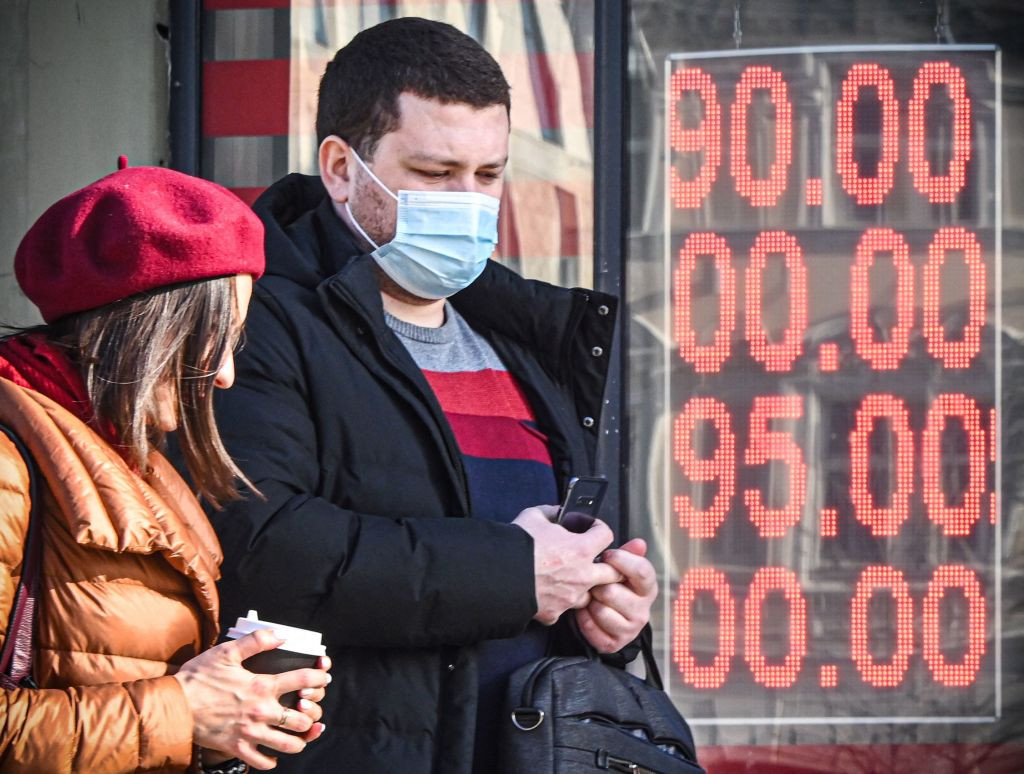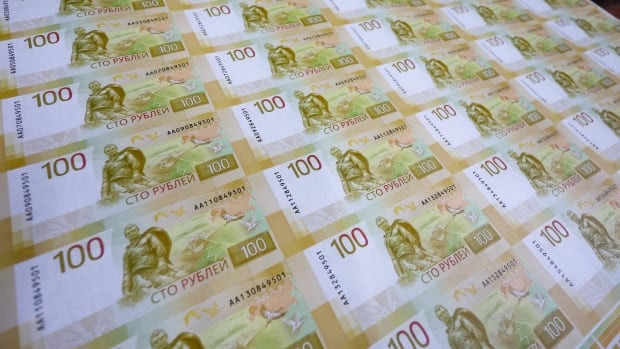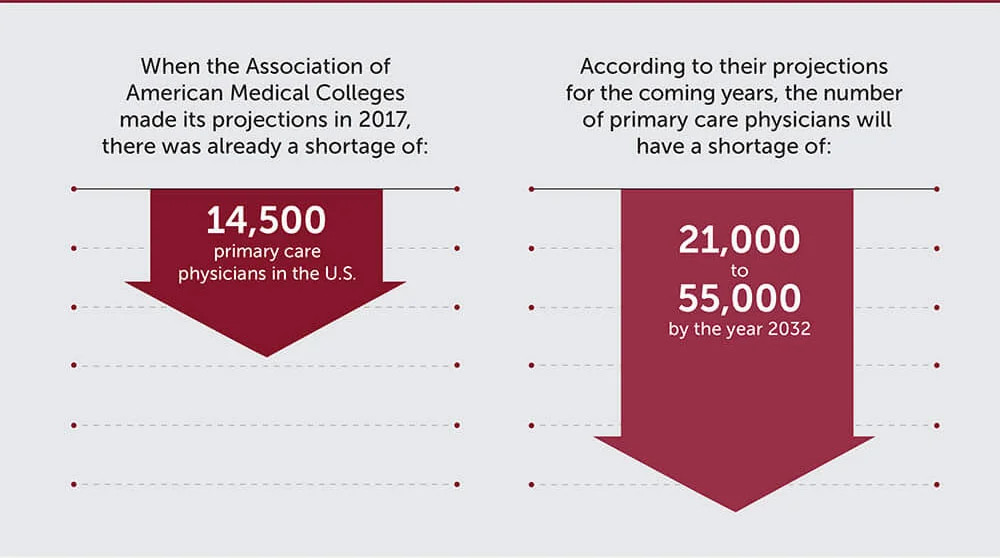Ruble Freefall: A Perfect Storm of Sanctions and Economic Instability
The Russian ruble has experienced a dramatic plunge, reaching its weakest point against the US dollar since the early days of the Ukraine conflict. This sharp depreciation, exceeding 24% since early August, reflects a confluence of factors, including intensified Western sanctions, a weakening economy, and the potential for further currency outflow. The situation raises concerns about the long-term stability of the Russian economy and its ability to sustain the ongoing conflict.
The Impact of Sanctions: Gazprombank and Beyond
The recent US Treasury Department sanctions targeting over 50 Russian banks, including the significant Gazprombank, have significantly hampered Russia's access to international payment channels. This action follows earlier sanctions that had spared Russian gas exports to Europe, a decision driven by Europe's heavy reliance on these supplies. However, with reduced dependence on Russian gas, the impact of these latest measures on Russia's trade balance is severe, contributing significantly to the ruble's decline. The loss of this crucial revenue stream, coupled with difficulties in processing international payments, threatens to further diminish the value of the Russian currency. This is further compounded by the fact that purchasers of Russian gas and oil will need to find alternative payment methods, a process that is likely to be protracted and add to the economic uncertainty. The Financial Times reported on the complexities of these alternative payment mechanisms and the challenges faced by Russian businesses dealing with international transactions.
Gazprom's Plight: A Microcosm of Russia's Economic Woes
Gazprom, once Russia's largest company by market capitalization, is now facing record losses as foreign sales plummet due to sanctions and reduced demand. This decline illustrates the broader economic fallout stemming from the conflict in Ukraine and the resulting sanctions. Before the war, Gazprom was a linchpin of the Russian economy. Now it serves as a stark example of the impact of international pressure on crucial sectors. The weakening ruble, while potentially beneficial for some domestic exports, presents a significant challenge for this and other struggling Russian businesses.
Inflation and Interest Rates: A Vicious Cycle
The ruble's devaluation is exacerbating existing inflationary pressures in Russia. With October's inflation already exceeding 8.5 percent—more than twice the Russian Central Bank's (CBR) target—the weakening currency further pushes up the cost of imported goods, increasing the burden on Russian consumers. In response, the CBR has raised its key interest rate to 21 percent, a level higher than that seen at the start of the war, but analysts predict the rate could increase even higher when the Central Bank meets in December. This high interest rate, while intended to bolster the ruble and combat inflation, has yet to attract significant investment, indicating the scale of the economic challenges facing Russia. The high inflation, exacerbated by labor shortages and increased military spending, creates a difficult situation for the CBR as it attempts to stabilize the ruble and manage inflation simultaneously. This situation has sparked discussions regarding other possible measures the CBR may consider to counter the economic fallout of the crisis.
A Weaker Ruble: Benefits and Drawbacks
The ongoing depreciation of the ruble presents a double-edged sword for Russia. While a weaker currency boosts exports in the short term, making Russian goods more competitive in international markets, it simultaneously fuels inflation and reduces the purchasing power of Russian citizens. The higher costs of imported goods make it challenging for those who rely on imported necessities, causing financial strain for ordinary Russians. This weakens the domestic economy while having an effect on the overall balance of trade.
The lower-value ruble will favor domestic exports, especially as Russia is an exporting country with a significant trade surplus. However, the sanctions packages imposed are having their negative effects, felt by Russians mainly in the form of high inflation. There is some debate over whether a weaker currency, while advantageous for certain sectors, is ultimately beneficial given the economic instability and ongoing geopolitical tensions. As one analyst pointed out, the situation presents complex challenges to the CBR and the government as they attempt to manage conflicting economic pressures.
The Kremlin's Strategy: A Calculated Risk?
Recent statements by the Russian finance minister suggest a degree of acceptance, perhaps even a strategic preference, for a weaker ruble. This perspective reflects the belief that such a strategy could bolster the economy's ability to finance its war efforts and maintain some measure of public spending. This view is supported by the observation that the weak rouble is indeed benefiting exporting companies, offsetting the negative impact of the Central Bank's high benchmark interest rate. A weaker ruble allows Russia to finance its war in Ukraine more effectively in the short term by reducing the real cost of arms purchases and soldiers’ salaries. However, sustaining this policy in the long term poses significant risks.
Russia's Economic Resilience: A Contested Narrative
While Russia's economy has shown greater resilience to sanctions than initially anticipated, concerns remain about the long-term consequences of the ongoing conflict. Surging military expenditures, a deepening labor shortage, and the potential for escalating sanctions paint a concerning picture for the future of the Russian economy. The allocation of nearly a third of Russia’s 2024 budget to military spending, the highest level since the Cold War, highlights the immense financial burden of the war. This underscores the strain on the economy and raises questions about the sustainability of the current trajectory.
The Road Ahead: Uncertainty and Challenges
The future of the ruble and the Russian economy remains uncertain. With the potential for further sanctions, a persistent labor shortage, and a continued reliance on military spending, the challenges facing Russia are significant. Analysts predict a continued weakening of the ruble, potentially reaching levels unseen since the initial shock of the invasion of Ukraine. The current economic woes of Russia are likely to remain a focus in upcoming discussions as the ongoing war presents many challenges to the country's financial stability. The next steps taken by the Russian government and central bank will be critical in determining the trajectory of the Russian economy. The ongoing situation warrants careful monitoring.


















